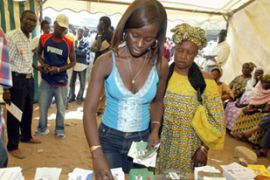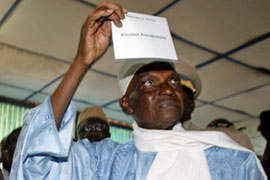Senegalese vote for new president
Polling being monitored by 2,000 observers has generally been peaceful.

Published On 25 Feb 2007
About 2,000 poll observers, among them 500 international observers, have been deployed to watch the process across the country.
Tackling poverty
Abdoulaye Wade, the current president, is 80 years old. First elected in March 2000, he has said he is confident that he will get at least 50 per cent of the ballots and avoid a run-off round of voting.
During his presidency, Wade, embarked on large infrastructural projects including construction of freeways and hotels in areas popular with tourists.
But unemployment is still high and his critics accuse him of corruption and not adequately tackling poverty.
Over the last year, a record number of young Senegalese have risked their lives attempting to reach Europe, often in unstable boats, and many are believed to have died at sea.
Senegal ranks number 156 out of 177 countries on the UN human development index and emigration by Senegalese seeking better lives in Europe has become one of the electoral issues.
Candidates
 |
| Wade has said he is confident he will get at least 50 per cent of the ballots [AFP] |
Voters in this election will be choosing between a record 14 challengers.
Wade’s rivals for the post of president include Idrissa Seck, 47, who had been considered a successor to Wade before the two fell out and Seck was imprisoned for seven months.
Wade warned on Friday, speaking two days after his supporters clashed with those of Seck leaving 10 people injured, that he will crack down on any unrest arising from the outcome of the vote.
Other leading contenders are Ousmane Tanor Dieng, a 60-year-old from the former ruling Socialist Party, and Moustapha Niasse, 68 and an ex-prime minister who served in the governments of both Wade and Abdou Diouf, the Socialist Party leader.
When Wade defeated Diouf in 2000, he won a seven-year mandate, but a new constitution adopted after a referendum in 2001 shortened the presidential term to five years and boosted the powers of the prime minister.
Source: News Agencies